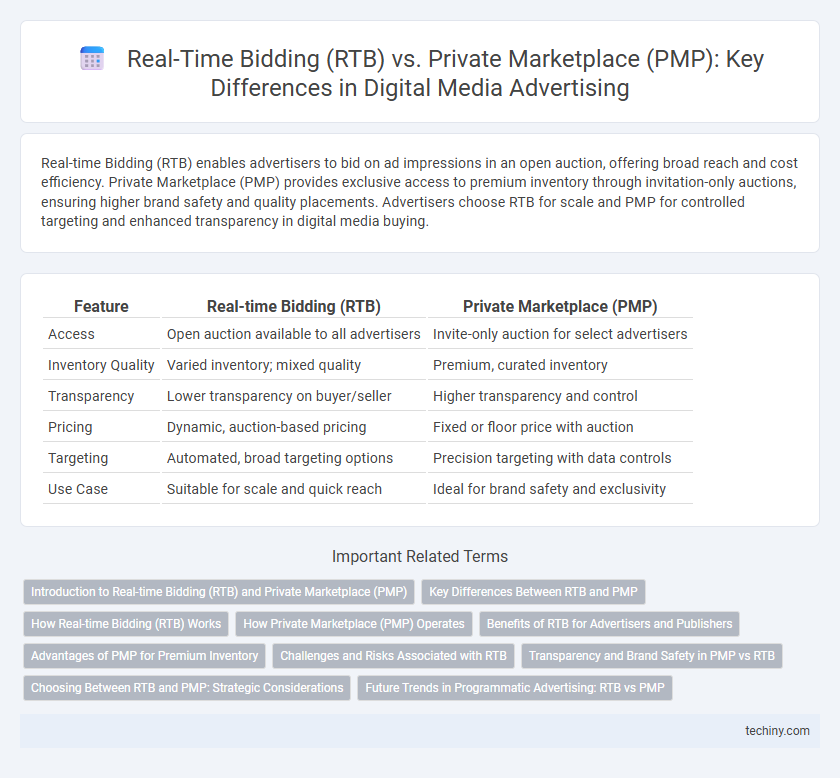Real-time Bidding (RTB) enables advertisers to bid on ad impressions in an open auction, offering broad reach and cost efficiency. Private Marketplace (PMP) provides exclusive access to premium inventory through invitation-only auctions, ensuring higher brand safety and quality placements. Advertisers choose RTB for scale and PMP for controlled targeting and enhanced transparency in digital media buying.
Table of Comparison
| Feature | Real-time Bidding (RTB) | Private Marketplace (PMP) |
|---|---|---|
| Access | Open auction available to all advertisers | Invite-only auction for select advertisers |
| Inventory Quality | Varied inventory; mixed quality | Premium, curated inventory |
| Transparency | Lower transparency on buyer/seller | Higher transparency and control |
| Pricing | Dynamic, auction-based pricing | Fixed or floor price with auction |
| Targeting | Automated, broad targeting options | Precision targeting with data controls |
| Use Case | Suitable for scale and quick reach | Ideal for brand safety and exclusivity |
Introduction to Real-time Bidding (RTB) and Private Marketplace (PMP)
Real-time Bidding (RTB) enables advertisers to bid on individual ad impressions through automated auctions, optimizing ad spend and targeting precision in milliseconds. Private Marketplace (PMP) offers a curated environment where select advertisers access premium inventory via invitation-only auctions, enhancing brand safety and control. Both RTB and PMP leverage programmatic technology but differ in transparency, exclusivity, and audience reach for digital media campaigns.
Key Differences Between RTB and PMP
Real-time Bidding (RTB) enables advertisers to bid on individual ad impressions in an open auction, offering maximum reach and cost-efficiency but with less control over brand safety. Private Marketplace (PMP) involves invitation-only auctions with selected premium publishers, providing higher transparency, better targeting, and prioritized access to quality inventory. RTB excels in scale and real-time decision-making, while PMP emphasizes exclusivity, enhanced data privacy, and superior inventory quality.
How Real-time Bidding (RTB) Works
Real-time bidding (RTB) operates through an automated auction where advertisers bid on individual ad impressions in milliseconds as a user loads a webpage or app. Demand-side platforms (DSPs) evaluate data signals such as user demographics, behavioral patterns, and browsing history to determine bid values dynamically. This process enables precise targeting and efficient ad spend by matching impressions to the highest bidder in real time.
How Private Marketplace (PMP) Operates
Private Marketplace (PMP) operates through invitation-only auctions where premium digital media inventory is offered to select advertisers, ensuring brand safety and exclusive access to high-quality audiences. Unlike open Real-time Bidding (RTB), PMP deals involve pre-negotiated deals that guarantee fixed pricing or floors, enhancing transparency and control for both publishers and advertisers. This controlled environment supports targeted ad placements with reduced fraud risk and improved campaign performance metrics.
Benefits of RTB for Advertisers and Publishers
Real-time bidding (RTB) offers advertisers dynamic access to a vast inventory, enabling precise audience targeting and flexible budget allocation for optimal ad spend efficiency. Publishers benefit from RTB by maximizing revenue through competitive bidding from multiple advertisers, increasing fill rates and transparency in demand sources. The automated, data-driven nature of RTB enhances campaign performance, providing both advertisers and publishers with granular analytics and real-time optimization capabilities.
Advantages of PMP for Premium Inventory
Private Marketplaces (PMP) provide exclusive access to premium inventory, ensuring higher brand safety and quality placements compared to Real-time Bidding (RTB). PMP deals offer greater transparency and control over the audience targeting, fostering stronger advertiser-publisher relationships. The fixed pricing models in PMP help avoid bid volatility, securing consistent ad placements in sought-after digital media properties.
Challenges and Risks Associated with RTB
Real-time Bidding (RTB) faces significant challenges such as heightened fraud risks, including invalid traffic and bot activity, which can inflate campaign costs and reduce ROI. The lack of transparency in RTB environments complicates brand safety measures, leading to potential ad placements alongside inappropriate or non-brand-safe content. Privacy regulations like GDPR and CCPA impose strict data usage constraints, increasing compliance risks and limiting targeting capabilities in RTB transactions compared to more controlled Private Marketplace (PMP) deals.
Transparency and Brand Safety in PMP vs RTB
Private Marketplaces (PMPs) offer enhanced transparency by providing advertisers direct access to premium inventory with detailed insights into audience data and placement, reducing fraud risks compared to Real-time Bidding (RTB). PMP deals ensure greater brand safety through curated, invitation-only environments that prevent ads from appearing alongside inappropriate content, unlike the open auction nature of RTB which can expose ads to less controlled and potentially harmful contexts. This level of control in PMP allows advertisers to maintain brand integrity, while RTB's programmatic scale comes with increased exposure to transparency challenges and brand safety concerns.
Choosing Between RTB and PMP: Strategic Considerations
Choosing between Real-time Bidding (RTB) and Private Marketplace (PMP) hinges on campaign control, targeting precision, and budget allocation. RTB offers access to a vast inventory with automated bidding, ideal for broad reach and cost efficiency, while PMP provides premium, curated inventory with enhanced transparency and brand safety. Marketers prioritize PMP for measured exclusivity and quality assurance, and RTB for scalability and dynamic optimization.
Future Trends in Programmatic Advertising: RTB vs PMP
Future trends in programmatic advertising indicate a shift towards Private Marketplaces (PMP) offering enhanced brand safety, premium inventory access, and greater transparency compared to Real-time Bidding (RTB). Advances in AI-driven targeting and data analytics are expected to optimize PMP deals, fostering stronger advertiser-publisher relationships and higher-quality audience engagement. Meanwhile, RTB will continue evolving with improved fraud prevention and real-time data integration to maintain its dominance in scale-focused, cost-efficient campaigns.
Real-time Bidding (RTB) vs Private Marketplace (PMP) Infographic

 techiny.com
techiny.com